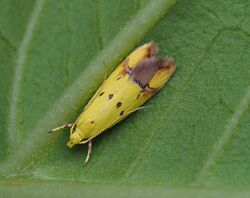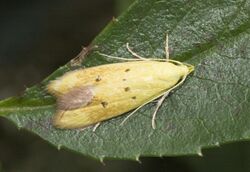Biology:Gymnobathra flavidella
| Gymnobathra flavidella | |
|---|---|

| |
| Scientific classification | |
| Domain: | Eukaryota |
| Kingdom: | Animalia |
| Phylum: | Arthropoda |
| Class: | Insecta |
| Order: | Lepidoptera |
| Family: | Oecophoridae |
| Genus: | Gymnobathra |
| Species: | G. flavidella
|
| Binomial name | |
| Gymnobathra flavidella (Walker, 1864)[1]
| |
| Synonyms[1] | |
| |
Gymnobathra flavidella is a species of moth in the family Oecophoridae. It is endemic to New Zealand. The host plants for the larvae of this species include Brachyglottis repanda and Gahnia procera.
Taxonomy
This species was first described by Francis Walker in 1864 using the name Gelechia flavidella.[2]
Description
The forewings of this species measure between 4.5mm and 8.5mm in length.[3]
G.V. Hudson described the species as follows:
The expansion of the wings varies from slightly over 1/2 inch to nearly 3/4 inch. The fore-wings are bright yellow, with rosy brown markings; there is a minute mark on the costa at the base, a very indistinct costal edging and apical shading and three more or less distinct dark brown discal dots; a conspicuous triangular patch of rosy-brown is situated at the tornus, boarded towards the base with a blackish-brown line, which extends as a faint cloudy mark towards the costa. The hind-wings are white with the costal and terminal portions strongly clouded with pale rosy-brown. The cilia of all the wings are rosy-brown. In some specimens the fore-wings are more or less clouded with orange-brown and, as already indicated, there is considerable variation in size.[4]
Distribution
This species is found only in New Zealand.[5] It is common in all areas of the North Island and in the top half of the South Island as far as Christchurch and Franz Josef.[3][4]
Host species
The larvae of G. flavidella live within and feed on Brachyglottis repanda.[4][6] Gahnia procera has also been recorded as a host species.[3][6]
References
- ↑ 1.0 1.1 Dugdale, J. S.. "Lepidoptera - annotated catalogue, and keys to family-group taxa". Fauna of New Zealand 14: 92. ISSN 0111-5383. OCLC 20332003. https://www.landcareresearch.co.nz/__data/assets/pdf_file/0017/26324/FNZ14Dugdale1988.pdf. Retrieved 2018-01-15.
- ↑ Walker, Francis (1864). "Part XXIX. Tineites." (in en). List of the Specimens of Lepidopterous Insects in the Collection of the British Museum. pt. 29: 563–835. https://biodiversitylibrary.org/page/38948235.
- ↑ 3.0 3.1 3.2 Hoare, Robert J. B. (2014). A photographic guide to moths & butterflies of New Zealand. Ball, Olivier.. Auckland: New Holland Publishers (NZ) Ltd. pp. 29. ISBN 9781869663995. OCLC 891672034. https://www.worldcat.org/oclc/891672034.
- ↑ 4.0 4.1 4.2 Hudson, George Vernon (1928). The butterflies and moths of New Zealand.. Wellington, N.Z.: Ferguson & Osborn Ltd.. pp. 275. OCLC 4112351. http://www.bugz.org.nz/WebForms/ResultDetails.aspx?CurrentDoc=C7E94865-492F-45DA-9777-CC8E1E8B1438&back=true&NewDoc=true&searchType=1&SearchString=G.V.++Hudson.
- ↑ "Gymnobathra flavidella (Walker, 1864)". Landcare Research New Zealand Ltd. http://www.nzor.org.nz/names/1c2b9c32-fa2f-40a6-b393-caf6efecce3c.
- ↑ 6.0 6.1 "Gymnobathra flavidella - Invertebrate herbivore biodiversity assessment". https://plant-synz.landcareresearch.co.nz/ReportForm.aspx?RecordId=450&Type=H&ReportType=Adv&SortBy=Alpha&Biostatus=a,c,e,n.
External links
Wikidata ☰ Q13648985 entry
 |


